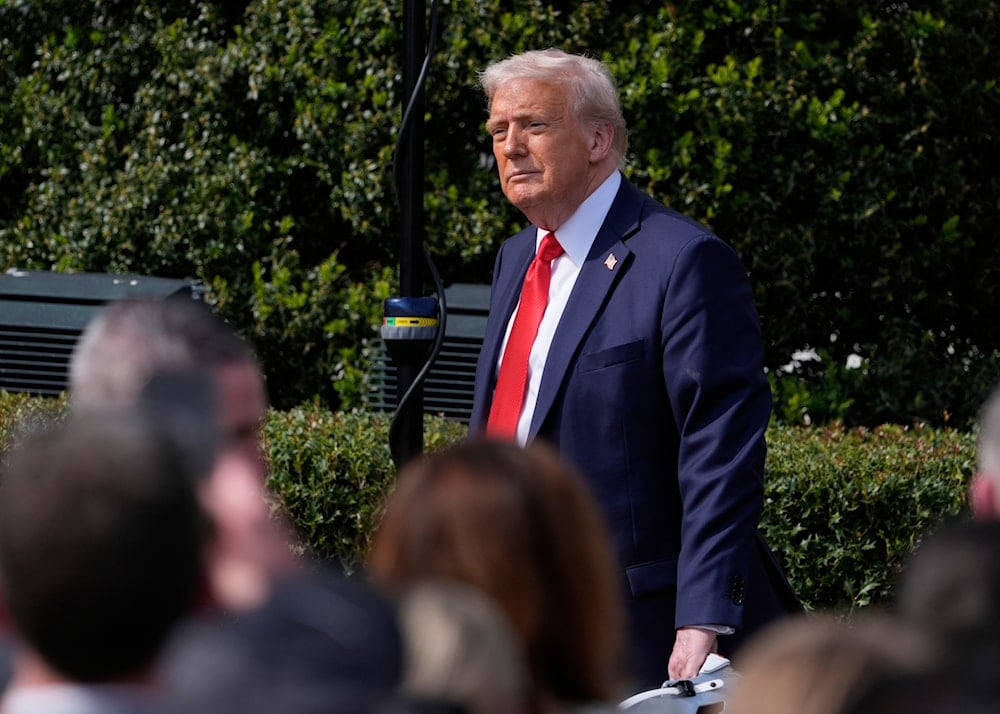White House to ask Congress to cut $9bln in funds including USAID, NPR
The White House is preparing a rescission package set to propose cutting $9.3 billion in funding, targeting public broadcasting, USAID, and other agencies.
-

US President Donald Trump departs after welcoming the 2025 College Football National Champions, the Ohio State University football team, during an event on the South Lawn of the White House on April 14, 2025, in Washington. (AP)
On Tuesday, The Hill reported that the White House is preparing a rescission package that would seek to retrieve $9 billion in approved funding back to Congress through cuts to public broadcasting, the US Agency for International Development (USAID), and agencies that President Donald Trump aimed to eliminate.
In a statement to The Hill, a White House official confirmed that Congress would receive the package, which requests to eliminate $9.3 billion in spending, on April 28.
That includes money for the Corporation for Public Broadcasting, which oversees PBS and NPR, money for USAID, and agencies like the US Institute of Peace, which Trump aimed to dismantle via an executive order signed in February.
The New York Post, which initially broke the story, reported that the request includes around $1 billion in funding for the Corporation for Public Broadcasting and over $8 billion for USAID and other State Department initiatives.
Trump's funding cut proposal
The request criticizes certain funding allocations by these organizations, arguing they conflict with the Trump administration’s values. One example cited is a 2022 PBS documentary, Our League, which tells the story of a transgender woman coming out to her Ohio bowling league.
It also highlights past social media posts by NPR CEO Katherine Maher, in which she referred to Trump as a “fascist.” Maher has since apologized for those comments.
The rescission package outlines several State Department and USAID programs slated for cuts, citing their misalignment with Trump’s policy priorities. Examples include $500,000 for electric bus initiatives in Rwanda, $750,000 aimed at combating xenophobia in Venezuela, and $3 million for a children’s educational television program in Iraq.
In order to revoke the funding already approved by Congress, the package would need to pass both the House and Senate with a simple majority. While Republicans currently hold control of both chambers, their edge in the House remains slim.
It is worth noting that for months, Trump and his allies have taken aim at public broadcasters such as NPR, accusing them of political bias. Some Republicans have labeled NPR’s coverage as overly liberal. In response, leaders from NPR and PBS testified before a House Oversight and Government Reform subcommittee in March to defend their operations.
The president has also stepped up efforts to dismantle USAID, calling it an agency run by “radical lunatics.”
Aid cuts
Last February, the Trump administration launched mass layoffs at USAID, placing most staff on administrative leave and initiating a Reduction-in-Force affecting about 1,600 U.S.-based employees.
By March 2025, the world saw the elimination of approximately 5,200 out of the agency’s 6,200 programs. That same month, a federal judge ruled that Musk and the Trump administration likely violated the US Constitution by shutting down USAID, ordering its reinstatement, and blocking further dismantling efforts.
Subsequent reversals followed, with the State Department on April 9 reinstating cuts to emergency food aid in Somalia, Syria, Lebanon, Jordan, Iraq, and Ecuador, just days after the Trump administration had notified the UN World Food Program of funding terminations in over a dozen countries, according to the Associated Press (AP). However, aid to Afghanistan and Yemen, both devastated by war, remains suspended.
Trump has made claims that USAID is plagued by corruption and controlled by "radical left lunatics," while Elon Musk has labeled it a "criminal" organization. In February, Congressman Scott Perry accused USAID of inadvertently funding terrorist groups, intensifying scrutiny and reportedly leading the agency to pause its global operations.

 4 Min Read
4 Min Read









